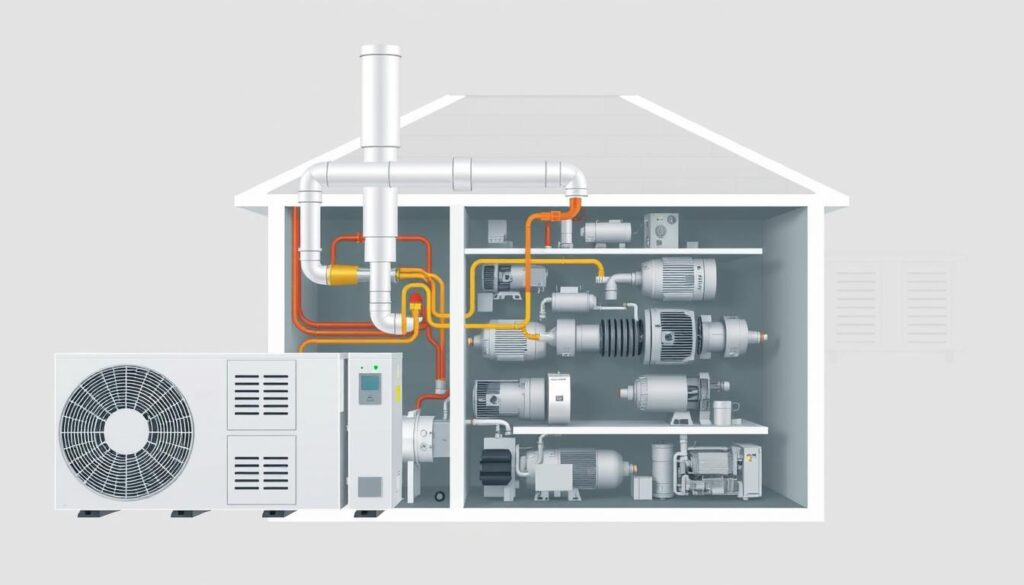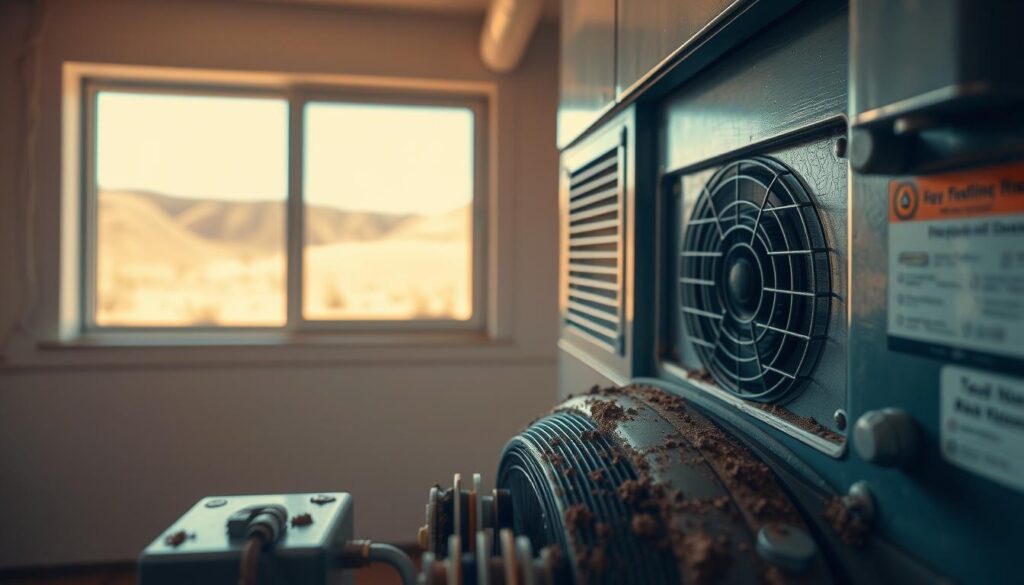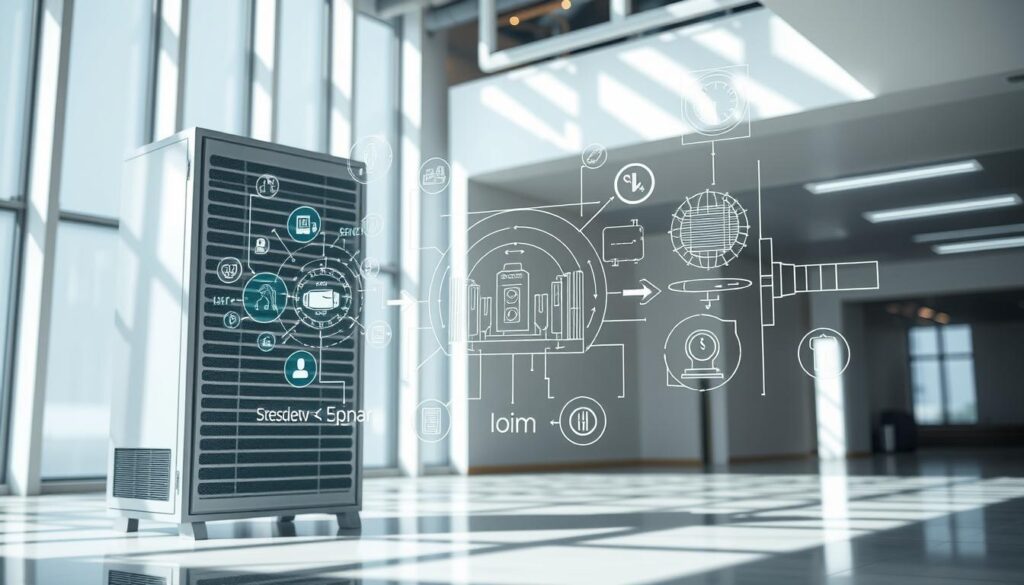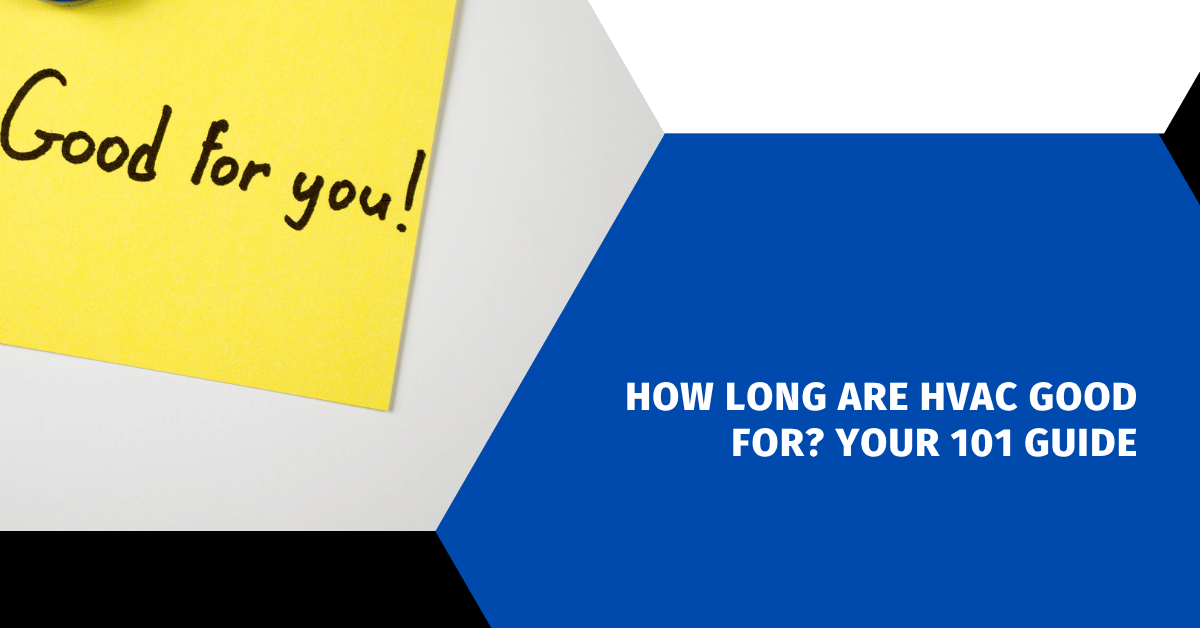Affiliate Disclosure
HVAC Guide Guys is a participant in the Amazon Services LLC Associates Program, an affiliate advertising program designed to provide a means for sites to earn advertising fees by advertising and linking to Amazon.
Ever thought about how long your HVAC system will keep your home comfy? Knowing how long an HVAC system lasts is key for smart home decisions. It helps you save money on heating and cooling.

Today’s HVAC systems are built to last, but they’re not forever. They usually last 15 to 25 years. Some parts, like your air conditioner, might only last 15 to 20 years. But, a well-cared-for gas furnace could go up to 30 years.
How long an HVAC system lasts depends on many things. This includes how well you maintain it, the weather, and how often you use it. Places near the coast, for example, can make systems last less because of salt and harsh weather.
Key Takeaways
- Average HVAC system lifespan ranges from 15 to 25 years
- Regular maintenance can extend system performance
- Different components have unique durability expectations
- Environmental factors impact HVAC system longevity
- Proactive replacement can prevent unexpected breakdowns
Table of Contents
Understanding HVAC System Lifespans: A Comprehensive Guide
Homeowners need to know what affects their HVAC system’s life. Your HVAC is a big investment. Knowing its lifespan helps you plan for upkeep and possible replacements.
The lifespan of an HVAC unit varies from 10 to 30 years. This depends on several key factors. Different parts of your HVAC system have different lifespans. This affects your home’s comfort and energy use.
Average Lifespan by System Type
- Furnaces: 15 to 25 years
- Boilers: 20 to 35 years
- Air Conditioning Units: 10 to 15 years
- Heat Pumps: 10 to 16 years
- Ductless Mini-Splits: 10 to 30 years
Factors Affecting System Duration
Several things can affect how long your HVAC system lasts:
- Maintenance frequency
- Installation quality
- Usage patterns
- System size and efficiency
Geographic Location Impact
Your local area greatly affects your HVAC system’s life. Places near the coast with lots of salt can make your HVAC system last less. This can shorten its life by several years.
Regular maintenance can extend your HVAC system’s life by up to 50%.
Knowing these factors helps you make better choices for your HVAC system’s care and when to replace it.
Explore Our HVAC Shop
Looking for top-rated HVAC tools, parts, and accessories? Visit our shop and find the perfect solution for your needs.
Visit the ShopThe Expected Longevity of Different HVAC Components
Knowing when to replace your HVAC system is important for homeowners. Each part of your system has a specific lifespan. This affects how well your heating and cooling work.
Different parts of your HVAC system last for different lengths of time:
- Central Air Conditioning Units: 15-20 years
- Furnaces: 15-30 years
- Heat Pumps: 10-20 years
- Ductwork: 15-25 years
How long your HVAC system lasts depends on a few key things. Proper maintenance, how well it was installed, and the environment it’s in all matter. These factors help determine how long each part will work well.
| HVAC Component | Average Lifespan | Key Factors Affecting Duration |
|---|---|---|
| Compressor | 10-15 years | Maintenance, Usage Intensity |
| Heat Exchanger | 15-20 years | Corrosion, Regular Servicing |
| Ductwork | 15-25 years | Insulation, Sealing Quality |
“Regular maintenance can significantly extend the life of your HVAC components and improve overall system efficiency.” – HVAC Professional
Understanding how your HVAC system changes over time helps you make better choices. This includes knowing when to fix, maintain, or replace parts. Taking care of your system early on is the best way to keep it running well for a long time.
How Long Are HVAC Good For: Essential Timeline Breakdown
Knowing how long your HVAC system lasts is key for keeping your home in top shape. The age of your HVAC system greatly affects its lifespan.
How long an HVAC system lasts depends on several important factors. Most systems are built to work well for 15 to 25 years. Keeping them well-maintained is what really matters.
Residential System Durability
In homes, HVAC systems have different lifespans. Here’s a breakdown:
- Air Conditioning Units: 15-20 years
- Furnaces: 15-30 years
- Heat Pumps: 10-15 years
- Air Handlers: 15-25 years
Commercial System Expectations
Commercial HVAC systems face more wear and tear because they work harder. They usually last a bit less than home systems, from 10-20 years. This depends on how much they’re used and how well they’re cared for.
Warranty Period Considerations
Warranty periods are also important when thinking about HVAC lifespan. Most makers offer:
- Standard warranties: 1-5 years
- Extended warranties: Up to 10 years with product registration
- Professional installation can often extend warranty coverage
Regular upkeep can make your HVAC system last longer. This can save you a lot of money on early replacements.
Explore Our HVAC Shop
Looking for top-rated HVAC tools, parts, and accessories? Visit our shop and find the perfect solution for your needs.
Visit the ShopKey Signs Your HVAC System Needs Replacement
Knowing when to replace your HVAC system can prevent sudden breakdowns and high energy bills. It’s key for keeping your home comfortable and efficient.
Your old HVAC system might be showing signs it’s time for a new one. Spotting these signs early can help you avoid a complete system failure.
- Frequent Repairs: Spending over $500 a year on fixes might mean it’s time for a new system. About 30% of HVAC systems are replaced because repair costs are too high.
- Rising Energy Bills: An old system can raise your energy costs by up to 30%. As your system gets less efficient, you’ll use more energy.
- Age of System: Most HVAC systems last 15-20 years. The U.S. Department of Energy suggests replacing them every 10-15 years.
- Inconsistent Temperatures: If your home heats or cools unevenly, it could be a sign of trouble.
- Unusual Noises or Odors: Strange sounds or smells mean there might be mechanical problems or mold.
Thinking about these points can help you decide if fixing or replacing your system is best. It’s about keeping your home comfortable and saving on energy costs.
“A new HVAC system can improve indoor air quality and boost your home’s value,” according to industry experts.
Replacing your system early can prevent emergencies, cut down on long-term costs, and give you better comfort. Plus, you’ll get the latest, most energy-saving technology.
Maximizing Your HVAC System’s Lifespan Through Maintenance
To keep your HVAC unit running well, you need a good maintenance plan. Regular upkeep not only makes your system last longer but also works better and saves energy.
How often you maintain your HVAC is key to its long life. Experts say a detailed maintenance plan is essential for a smooth-running system.
Professional Service Requirements
Getting your HVAC checked by pros is vital. They can spot problems early, saving you from big repairs later. In fact, up to 75% of HVAC issues can be caught before they get worse.
- Schedule annual professional inspections
- Get thorough system tune-ups twice a year
- Check refrigerant levels
- Inspect electrical connections
DIY Maintenance Tips
There are things you can do at home to help your HVAC system. These actions can make it work better and last longer.
- Replace air filters every 1-3 months
- Keep outdoor units free from debris
- Clean air vents and registers often
- Watch how your system is doing
| Maintenance Task | Frequency | Impact on System |
|---|---|---|
| Air Filter Replacement | Every 1-3 months | Boosts efficiency by 5-15% |
| Professional Inspection | Annually | Helps avoid big repairs |
| Coil Cleaning | Yearly | Keeps system running well |
Pro Tip: Regular care can make your HVAC system last 5 to 15 years longer. It’s a smart move for your home’s comfort and energy use.
Explore Our HVAC Shop
Looking for top-rated HVAC tools, parts, and accessories? Visit our shop and find the perfect solution for your needs.
Visit the ShopEnvironmental Factors Affecting HVAC Longevity

Your HVAC system’s life depends a lot on the environment. Different places have different climates that affect how long your HVAC lasts. Knowing these challenges helps keep your system running longer.
Coastal areas are tough on HVAC systems. The salty air can make metal parts rust faster. This can shorten your system’s life by years. To keep your system working well, you need to protect it from the salt.
- Coastal areas: Salt corrosion reduces system life
- Desert regions: Extreme heat increases mechanical stress
- Humid climates: Higher moisture levels can cause faster component degradation
- Areas with significant temperature fluctuations: More strain on system components
Changes in your surroundings can also affect your HVAC. Cutting down trees might let more sun in, making your system work harder. New buildings nearby can bring dust and stress to your system.
Here are some ways to protect your HVAC from the environment:
- Install protective covers for outdoor units
- Regularly clean and maintain system components
- Use weather-resistant equipment in challenging environments
- Schedule professional inspections annually
By understanding and adapting to your environment, you can make your HVAC system last longer and work better.
Cost Considerations: Repair vs. Replace Decision
Understanding the cost of HVAC maintenance can be tough. Your HVAC system is a big investment. Knowing when to fix or replace it is key.
Choosing the right option depends on several factors. These factors affect your system’s performance and your budget. The “$5,000 rule” offers a simple way to decide.
The $5,000 Rule Explained
This rule helps homeowners decide between repair or replacement. Here’s how it works:
- Multiply your HVAC system’s age by the repair cost estimate
- If the total is over $5,000, replacing is usually better
- For example, a 10-year-old system needing a $600 fix would be $6,000
Energy Efficiency Benefits
New HVAC systems save a lot of energy. They can cut energy use by up to 35% compared to old ones. This means big savings over time.
Long-term Investment Analysis
When thinking about replacing, consider these points:
- How old is your system? (15-20 years is when you might need a new one)
- How often does it need repairs?
- What’s its energy efficiency rating?
- Are there tax credits or rebates available?
The Inflation Reduction Act of 2022 gives tax credits up to 30% for new heat pumps. This makes replacing your system more appealing financially for many.
Modern HVAC Technologies and Durability Improvements

New HVAC tech is changing how we think about heating and cooling. It’s making systems last longer and work better. Homeowners are seeing big changes in what their systems can do.
Technological leaps are making HVAC systems more efficient over time. Smart tech is giving us better control over our home’s climate:
- Variable-speed compressors that adapt to changing environmental conditions
- Smart thermostats enabling remote system monitoring
- High-efficiency heat pumps with extended operational lifespans
- Zoning systems for personalized temperature control
Modern heat pumps are a big step forward in HVAC tech. They usually last 10 to 15 years with the right care. Smart ventilation technologies let you track airflow and cut energy costs.
Government programs, like the Inflation Reduction Act, are helping people get more efficient HVAC systems. Ductless systems offer better temperature control, less noise, and save energy compared to old ducted systems.
By using the latest HVAC tech, you can make your home more comfortable. You’ll also save on energy bills and help the planet.
Planning for HVAC Replacement: Timing and Preparation
Getting ready for an HVAC replacement needs careful planning. Knowing when to replace your HVAC system is key. Most systems last 10 to 15 years, so planning ahead is important.
When thinking about replacing your HVAC, consider a few things:
- How old your current system is and how well it works
- Its energy efficiency
- Changes in your comfort needs
- What you can afford to spend
- How much you could save on energy
Think about the best time to replace your HVAC. Spring and fall are usually the best times. This is when HVAC pros are less busy, which can save you money and time.
It’s also important to plan your budget for the replacement. Look into:
- Rebates from manufacturers
- Tax credits for energy-efficient systems
- Low-interest financing options
- Home equity loans
The actual installation usually takes one to two days, depending on your home. Get quotes from different pros to find the best deal. A good HVAC system can save you money and make your home more comfortable in the long run.
Explore Our HVAC Shop
Looking for top-rated HVAC tools, parts, and accessories? Visit our shop and find the perfect solution for your needs.
Visit the ShopChoosing the Right HVAC System for Longevity
Choosing the right HVAC system is key to long-term comfort and efficiency. It’s not just about feeling good. It’s about how well your system will work for years to come.
When picking an HVAC unit, consider these important factors:
- System size and home compatibility
- Energy efficiency ratings
- Professional installation quality
- Manufacturer reputation
Knowing how long different parts of an HVAC system last is vital. Each type has its own durability:
| HVAC System Type | Average Lifespan | Maintenance Requirements |
|---|---|---|
| Central Air Conditioning | 12-17 years | Quarterly filter changes |
| Heat Pumps | 10-16 years | Annual professional tune-ups |
| Geothermal Systems | 25-30 years | Minimal maintenance |
Getting help from a skilled HVAC contractor is essential. Their knowledge is as important as the equipment. They can suggest systems that fit your home, climate, and energy goals.
Don’t just look at the initial cost. A quality system can save you money in the long run. It will cut down on energy bills and repair costs.
Conclusion
Knowing how long HVAC systems last is key for homeowners wanting comfort and efficiency. HVAC systems usually last 15 to 25 years. Air conditioners can last 10 to 15 years, and furnaces can go up to 20 years with good care.
How you maintain your HVAC system affects its lifespan. Regular checks, timely filter changes, and cleaning can make it last longer. If your energy bills go up or repairs happen more often, it might be time for a new system.
As your HVAC system gets older, planning is important. Getting a new one might cost more upfront, but it can save money in the long run. Talking to HVAC experts can help you decide the best course of action for your home.
Every HVAC system is different. Things like how well it was installed, how often you use it, and your local weather affect how long it lasts. Keep up with maintenance and be ready to get a new system when needed.

